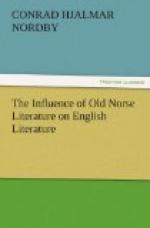There’s the note of the whole history—the will of the Norns and the note of a whole Northern literature, as it is of a whole Southern literature. Man, the puppet, in the hands of Fate; however man may think and reason and assure himself that the dispensation of Fate is just, the supreme moment of realization will always be a tragedy:
He hath seen the face of Brynhild,
and he knows why she hath come,
And that his is the hand that hath drawn her to
the Cloudy People’s
home:
He knows of the net of the days, and the deeds
that the Gods have bid,
And no whit of the sorrow that shall be from his
wakened soul is hid.
(P. 226.)
In such an hour, what are conquests of a glorious past, what are honors, crowns, loves, hates? The mind can think of little matters only:
His heart speeds back to Hindfell,
and the dawn of the wakening day;
And the hours betwixt are as nothing, and their
deeds are fallen away.
(P. 226.)
Is aught to be said to one in such a crisis, the words are weak and commonplace. There is Brynhild’s greeting to Sigurd:
If aught thy soul shall desire
while yet thou livest on earth,
I pray that thou mayst win
it, nor forget its might and worth.
The shattered mind of Sigurd tries to grasp the meaning of the harmless words, and like common sounds that are so fearful in the night, the phrases assume a terrible import:
All grief, sharp scorn, sore longing, stark death in her voice he knew.
Then again conies the dominant note of this story:
Gone forth is the doom of
the Norns, and what shall be answer thereto,
While the death that amendeth
lingers?
Here is a hint of the end of all—“the death that amendeth,” and from this point to the end of the story there is no gleam of happiness for anyone.
Book IV brings to a majestic close this mighty history. We have dwelt so long on the wonderful poetry of the other books that we must refrain from further comment in this strain. As we read these eloquent imaginings, we regret that the English reading public have left this work through fear of its great length or the ignorance of its existence, in the dust of half-forgotten shelves. Gold disused is true gold none the less, and the ages to come may be more appreciative than the present.
For the sake of rounding out this story, be it noted concerning this Book IV, that the poet has taken liberties with the saga story here, as elsewhere. Motives more easily understood in our day are assigned for the deeds of dread that throng these closing scenes. Gudrun weds King Atli at her mother’s bidding, and under the influence of a wicked potion, but neither mother nor magic drives the memory of Sigurd from her mind. She lives to bring destruction upon her husband’s murderers, and those murderers are her own flesh and blood. Through her appeals




